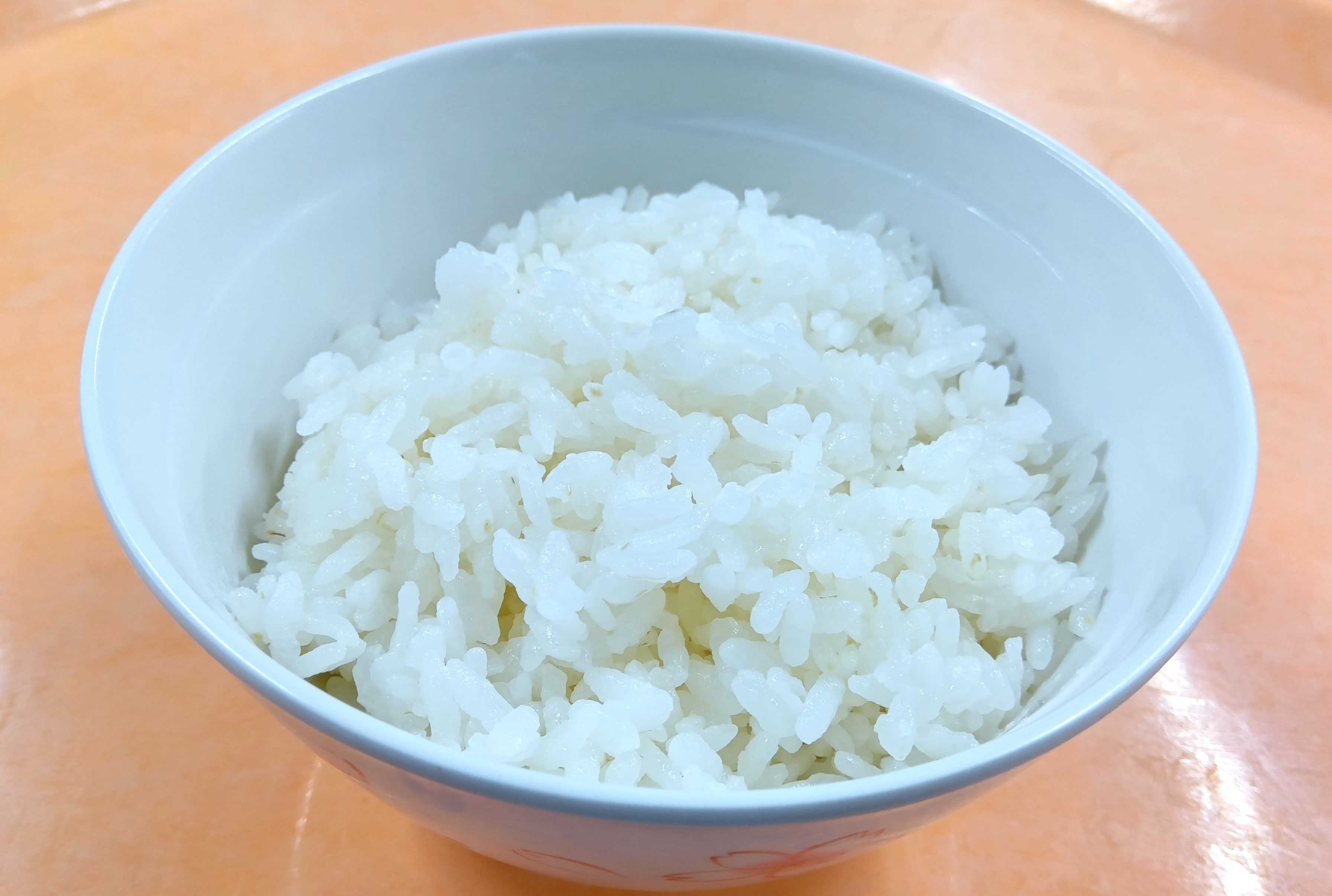Contributing to the SDGs
- Management Commitment
- Epson's Initiatives and Their Relationship to Our SDGs
- Building Awareness In-house
Management Commitment
Commitment to the SDGs
Innovation at Epson is guided by our corporate purpose: “Our philosophy of efficient, compact and precise innovation enriches lives and helps create a better world.” We want to play a part in creating a better world by working with our customers to address societal issues, including environmental problems, through innovative technologies and global co-creation.
This commitment is aligned with the sustainable development goals (SDGs) of the United Nations.
To this end, the entire Epson Group is committed to acting with integrity and embracing a spirit of creativity and challenge to deliver surprise and delight that exceed the expectations of our customers and partners.
Through these actions, we will contribute to the realization of sustainable development.
Junkichi Yoshida, Seiko Epson Corporation
Representative Director and President CEO

Epson's Initiatives and Their Relationship to Our SDGs
In the 2020 fiscal year, Epson identified four materialities (priority issues) that it should address in order to contribute to solutions to societal issues and progress toward its aspirational goal of achieving sustainability and enriching communities. Epson selected 12 key sustainability topics that it will act on to achieve the materialities.
After analyzing the relationship between the 12 key sustainability topics and the 17 Sustainable Development Goals (SDGs) based on the 169 SDG targets, we found that the actions we are currently taking will contribute to all 17 of the SDGs. (Please see the chart below for details.)
Epson will help to achieve the SDGs by acting on the key sustainability topics, thereby achieving sustainability and enriching communities.
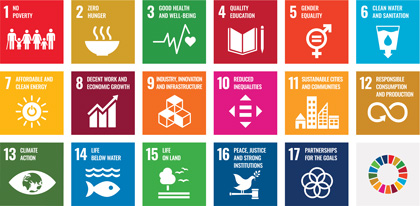
Key Sustainability Topics and Their Relationship to the 17 SDGs
There are 169 targets under the SDGs. The figures in the table below indicate the targets that Epson is addressing (as of August 2024).
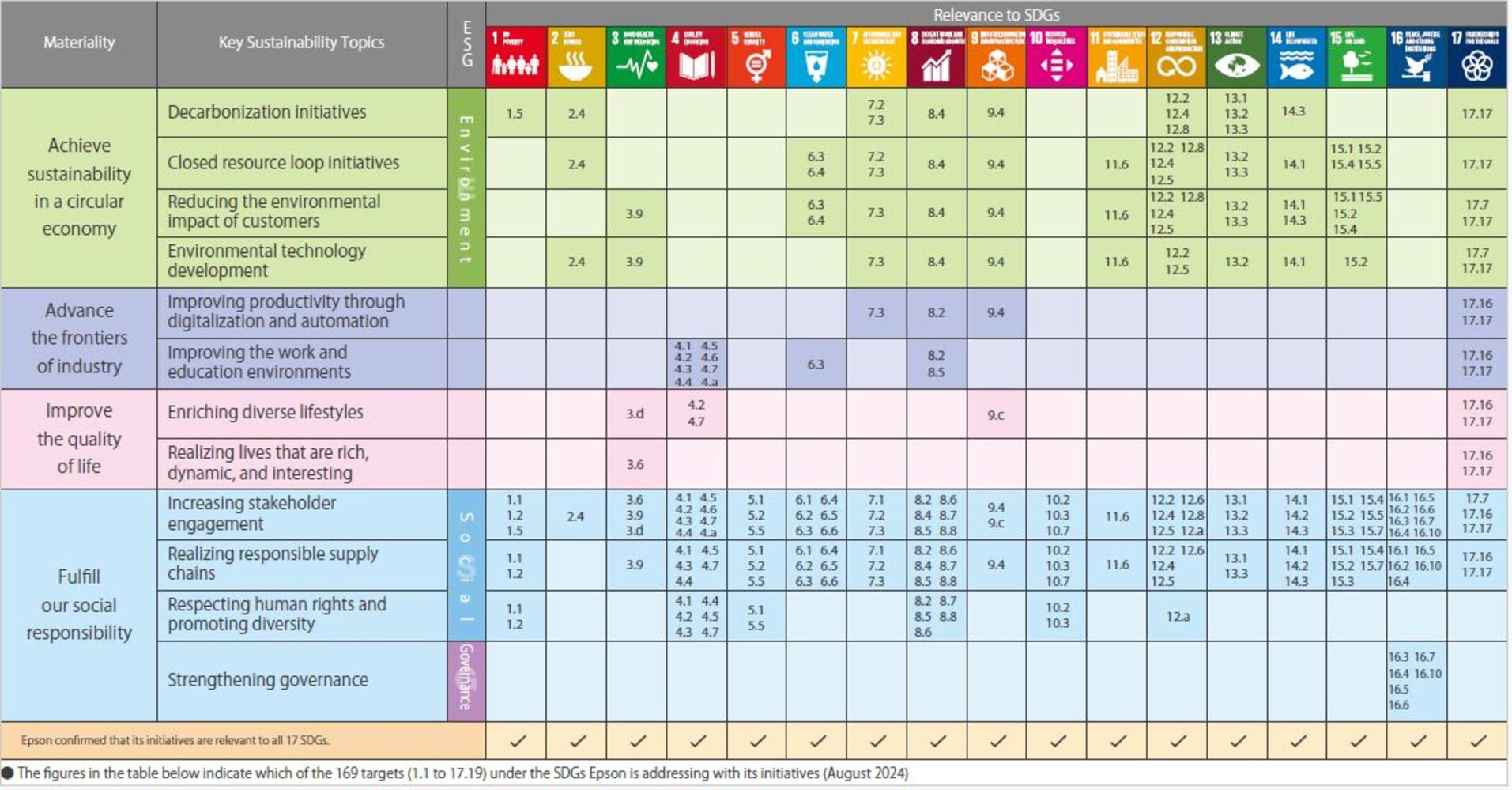
Promotion of SDGs by Utilizing Local Government Systems
Nagano Prefecture SDGs Enterprise
Nagano Prefecture, where Seiko Epson's head office is located, has established the Nagano Prefecture SDGs Enterprise Registration System as a system to promote the spread of SDGs among companies in the prefecture, in consideration of the three aspects of environment, society, and economy, in order to improve corporate value and strengthen competitiveness in collaboration with support organizations such as economic organizations, financial institutions, and universities. In order to further actively synchronize our activities with Nagano Prefecture's activities, we were registered as a Nagano Prefecture SDGs Enterprise (Phase 5) in July 2020, and renewed the registration period for an additional three years in FY2023. The "Declaration of Commitment to Achieve the SDGs" (Requirement 1) and "Specific Initiatives to Achieve the SDGs" (Requirement 2) are as follows. We report the progress of our SDGs initiatives to Nagano Prefecture every year and contribute to the achievement of the SDGs through Seiko Epson's supply chain.
Requirement 1: Declaration of Commitment to Achieve the SDGs (PDF, 200KB)
Requirement 2: Specific Initiatives to Achieve the SDGs (PDF, 730KB)
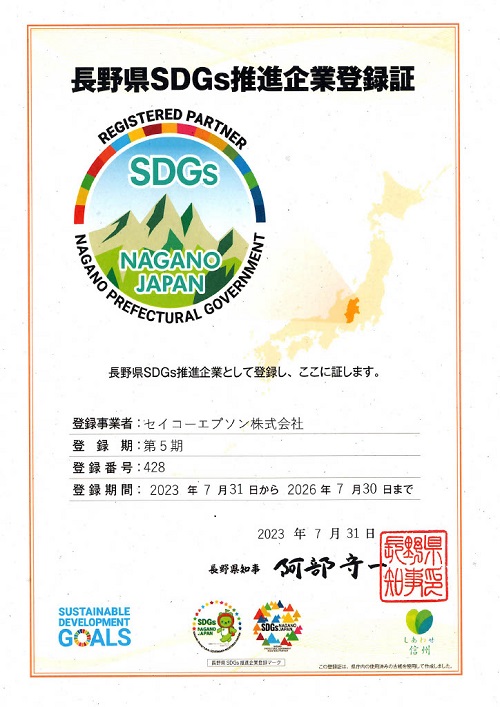
Registration as an SDG Partner in Nagano Prefecture
Nagano Prefecture, home to Seiko Epson's Head Office, has launched some of the most progressive SDG initiatives in Japan. One such initiative is an SDG partner registration system. The prefecture works with business groups, financial institutions, universities, and other supporting organizations in environmental, social, and economic areas to increase the value and competitiveness of local companies and to promote action against the SDGs among them.
To synchronize our actions with those of the Nagano Prefecture government, we applied for registration as an SDG partner based on the actions we have taken to date to achieve the SDGs.
A company must meet two requirements for registration:
- It must submit a written declaration of commitment to achieving the SDGs.
- Companies must take specific actions to achieve the SDGs.
Nagano Prefecture has been promoting the SDGs since 2018. The prefecture has asked local businesses to become SDG partners by committing to SDG actions. There are two requirements for becoming a partner. The first is to declare management policies and actions to achieve the SDGs. The second is to submit information about specific actions being taken in each of 42 items mapped to the 17 SDGs and 169 targets. Seiko Epson was registered as a Nagano Prefecture SDG partner (the fifth term) in July 2020, and renewed its registration in FY2023 for another three years.
We will report our progress on the SDGs annually to the prefecture government and will contribute to the achievement of the SDGs throughout our supply chain.
Registration to the Kitakyushu SDGs Registration System
In 2018, Kitakyushu City was selected as Japan's first SDGs Future City and Municipal SDG Model Project. Kitakyushu established a registration system to give visibility to companies and other enterprises that are contributing to the SDGs and to link them and their efforts to the Kitakyushu City SDGs Future City Plan, thereby stimulating and accelerating local SDG initiatives. Epson is registered as a Kitakyushu SDGs Registered Business under the Kitakyushu SDGs Registration System. Seiko Epson is currently working on the "KAMIKURU" project in Kitakyushu, which involves producing recycled paper using the PaperLab dry-process office papermaking machine and manufacturing and supplying upcycled products. Together with project participants, we will continue to contribute to Kitakyushu City's SDG activities by developing products and activities that reduce environmental impact, creating diverse employment opportunities, and providing educational opportunities to nurture future generations of talent.
Registration to the Kitakyushu SDGs Registration System
In 2018, Kitakyushu City was selected as Japan's first SDGs Future City and Municipal SDG Model Project. Kitakyushu established a registration system to give visibility to companies and other enterprises that are contributing to the SDGs and to link them and their efforts to the Kitakyushu City SDGs Future City Plan, thereby stimulating and accelerating local SDG initiatives. Epson is registered as a Kitakyushu SDGs Registered Business under the Kitakyushu SDGs Registration System. Seiko Epson is currently working on the "KAMIKURU" project in Kitakyushu, which involves producing recycled paper using the PaperLab dry-process office papermaking machine and manufacturing and supplying upcycled products. Together with project participants, we will continue to contribute to Kitakyushu City's SDG activities by developing products and activities that reduce environmental impact, creating diverse employment opportunities, and providing educational opportunities to nurture future generations of talent.
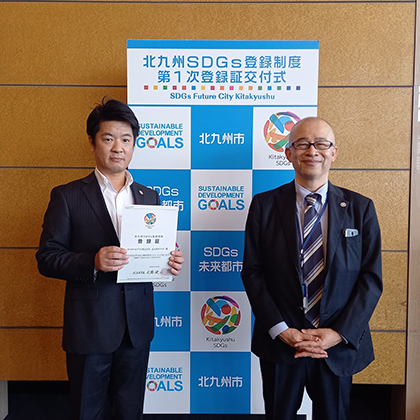
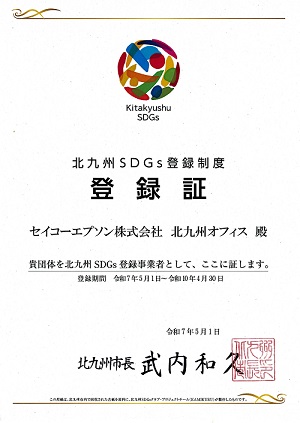
SDGs Grand Prize at the 2021 Kitakyushu SDGs Future City Awards
In March 2022, the Kamikuru Project, a scheme for producing and providing upcycled paper products using Epson's PaperLab office papermaking system, won the SDGs Grand Prize in the corporate category of the 2021 Kitakyushu SDGs Future City Awards. The project is run by Epson Sales Japan Corporation in Kitakyushu, Fukuoka.
At the ceremony, Mayor Kenji Kitabashi commented, "The Kamikuru project, which is composed of people from different industry groups in Kitakyushu, has contributed to many of the targets of the SDGs. The activities in the field of education have been particularly outstanding, and I am looking forward to seeing these activities expand in the future."
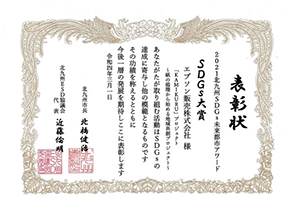
Cooperative Agreement with Local Government to Contribute to the SDGs
Sakata, Yamagata
Tohoku Epson Corporation manufactures critical printer components and semiconductors in Sakata, Yamagata Prefecture. In August 2025, the company signed a cooperative agreement with the city of Sakata to engage in business that will contribute to the local achievement of the U.N. Sustainable Development Goals (SDGs).
Under this agreement, Tohoku Epson will help to preserve the local environment and will contribute to social sustainability by utilizing local resources. Specifically, it will contribute to the:
- maintenance and preservation of local forests
- maintenance and preservation of local parks and green spaces
- preservation of the natural environment
- utilization of local resources and promotion of local revitalization
Volunteers from Tohoku Epson are recruited to participate in a local forest maintenance and preservation program, where they do things such as clear out underbrush, pick up trash, and plant trees in local pine forests.
Going forward, Tohoku Epson will continue to strengthen cooperation with the local community to revitalize local life and advance toward sustainability while contributing to the preservation of the environment and the future of the region.
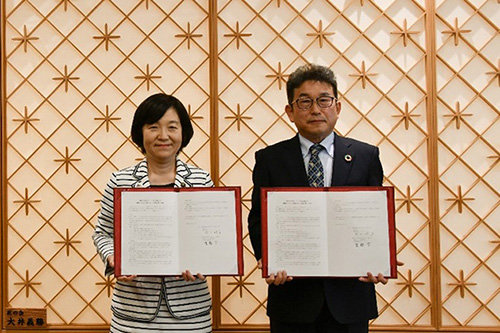
Building Awareness In-house
Contributing to the SDGs at Employee Cafeterias
Epson began serving Kinmemai rice* in its employee cafeterias in Nagano Prefecture in September 2000. Today, Kinmemai is served in all of the cafeterias in the prefecture.
This initiative is part of Epson's efforts to promote employee health while protecting the environment. It also contributes to the SDGs.
Kinmemai has the same nutritional value as brown rice but is as delicious as white rice, contributing to the maintenance of employee health. In addition, because it does not need to be rinsed, Kinmemai produces no wastewater, so it has less of an environmental impact.
One of the reasons Epson introduced Kinmemai was to prevent water pollution caused by discharging the water used to rinse rice from employee cafeterias. Rinsing water contains a lot of phosphorus and nitrogen, which are not completely removed in wastewater treatment. If washing water flows into rivers, it can cause eutrophication.
Kinmemai is also sustainable because the polishing process does not produce rinsing water. The bran that is removed from the rice is reused as fertilizer and for other purposes, which contributes to circular agriculture.
Thus, the introduction of Kinmemai in employee cafeterias con
tributes to the SDGs, including Goal 12 (Responsible Consumption and Production), Goal 3 (Good Health and Well-Being), Goal 15 (Life on Land), and Goal 14 (Life Below Water).
Kinmemai is a registered trademark of Toyo Rice Corporation.
